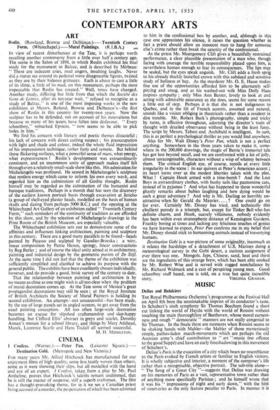CINEMA
I Confess. (Warner.)—Peter Pan. (Leicester Square.)— Destination Gobi. (Metropole and New Victoria.) FOR many years Mr. Alfred Hitchcock has manufactured for our enjoyment films of high quality, some less tautly woven than others, some as it were showing their slips, but all modelled with the hand and eye of an expert. I Confess, taken from a play by Mr. Paul Anthelme, proves that Hitchcock's talents remain undimmed, that he is still the master of suspense, still a superb craftsman. The film has a thought-provoking theme, for in it we see a Canadian priest being accused of a murder, the perpetration of which has been admitted to him in the confessional box by another, and, although in this case one appreciates his silence, it raises the question whether in fact a priest should allow an innocent man to hang for someone else's crime rather than, break the sanctity of the confessional.
As the priest Mr. Montgomery Clift gives a beautifully restrained performance, a clear plausible presentation of a man who, though facing with courage the terrible responsibility placed upon him, is nevertheless human enough to fear its consequences. The lips may be sealed, but the eyes speak anguish. Mr. Clift adds a fresh sprig to his already thickly laurelled crown with this subdued and sensitive study of holiness at bay. As the murderer Mr. 0. E. Hasse makes fine use of the opportunities afforded him to be alternately self- pitying and smug, and as his washed-out wife Miss Dolly Haas inspires sympathy ; only 'Miss Ann Baxter, lovely to look at and acting with admirable assurance as she does, seems for some reason a little out of step. Perhaps it is that she is not indigenous to Quebec, and in the lilt of French accents, assumed and natural, sounds like a visitor obliging in theatricals rather than a. resident in dire trouble. Mr. Robert Burk's photography, simple and tricky by turns, is effective throughout, adorning the director's train of thought with detailed observance without being in the least fussy. The script by Messrs. Tabori and Archibald is intelligent. In sum, this is as perfect a psychological thriller as you would find anywhere.
Alas for Mr. Walt Disney's Peter Pan, which is not a perfect anything. Somewhere in the three years taken to make it, some- where in the 200,000 drawings, the magic of Barrie's immortal tale has got lost beyond recall, and we are confronted with a lot of jolly, almost unrecognisable, characters without a wisp of whimsy between them. The critical English eye, of course, recoils at every little irregularity in the scene ; its ear quivers at Peter's American accent ; its heart turns over- at the modest liberties taken with the plot. ,What ! Captain Hook armed with a time-bomb ? And the Lost Boys in extraordinary clothes, with bushy tails like pantomime cats, instead of in pyjamas ? And what has happened to those wonderful ghastly remarks about babies laughing and how dying would be such a great adventure ? And why is Mr. Darling so horribly un- attractive when Sir Gerald du Maurier ? One could go on for ever. Certainly Mr. Disney has tried, and technically this ebullient parody is a triumph, but, except for Tinker Bell who has definite charm, and Hook, suavely villainous, nobody evidently has been within even stratospheric distance of Kensington Gardens. Frankly boring at times and lacking any felicitous touches of genius we have learned to expect, Peter Pan confirms me in my belief that Mr. Disney should stick to humanising animals instead of travestying humans.
Destination Gobi is a war-picture of some originality, inasmuch as it relates the hardships of a detachment of U.S. Marines doing a meteorological survey in the Gobi desert, a curious assignment if ever there was one. Mongols, Japs, Chinese, sand, heat and thirst are the ingredients of this strange brew, which has been ably cooked by Mr. Robert Wise and is served with rugged nonchalance by Mr. Richard Widmark and a cast of perspiring young men. Good schoolboy stuff based, one is told, on a true but quite incredible


































 Previous page
Previous page